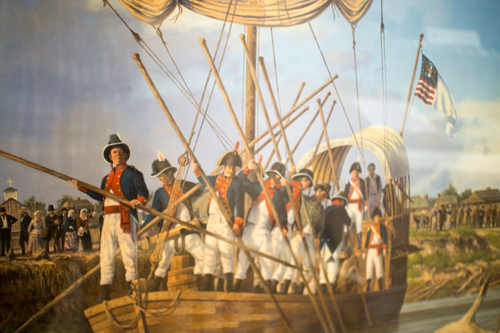On 4 August 1804, the captains were in a quandary as the barge (called the ‘boat’ or ‘barge’ but never the ‘keelboat’) and pirogues traveled between future Nebraska and Iowa. They were well downriver from the Mandan–Hidatsa villages, from which they intended to dispatch the barge back to St. Louis that summer or fall of 1804. The man they had assigned to lead the return party back to St. Louis, Cpl. Richard Warfington[1]Or Wareington, Warpenton, Warvington, Worthington, Wortheyton, or Worvington, depending upon the journalist and the day., had joined the army five years ago and his hitch was up this day. He could choose to leave the service, and hitch downriver with the next passing flotilla of fur traders. Happily, Warfington agreed to stay on, which turned out to mean spending the long, cold winter at Fort Mandan.
And so, on 7 April 1805, he and his crew of four men, plus two former Corps members, turned the barge downstream as the permanent party faced their canoes and pirogues westward. Warfington had charge of the precious journals and other records of the first year’s travel, botanical specimens, and preserved animal specimens—plus a live prairie dog and six live magpies. He also had to keep an eye on deserter Moses Reed and repentant mutineer John Newman. The barge took only about 47 days—until probably 23 May 1805—to travel downstream the distance that had taken 173 days, including pauses to visit the Yankton and Lakota Sioux, upward-bound.
In January 1807, Lewis wrote to Secretary of War Henry Dearborn, recommending that Warfington receive a bonus even though he did not serve in the permanent party:
Taking into view the cheerfulness with which he continued in the service after every obligation had ceased to exist, from the exposures, the fatigues, labour and dangers incident to that service, and above all the fidelity with which he discharged this duty . . .[2]Donald Jackson, ed., Letters of the Lewis and Clark Expedition with Related Documents, 1783-1854; 2nd ed., 2 vols. (Chicago: University of Illinois Press, 1978), 1:365.
Warfington deserved “something more than his pay of seven dollers pr. month.”
After that, Warfington disappears from the historical record, except for Clark’s listing him as still living in the mid-1820s.
Notes
| ↑1 | Or Wareington, Warpenton, Warvington, Worthington, Wortheyton, or Worvington, depending upon the journalist and the day. |
|---|---|
| ↑2 | Donald Jackson, ed., Letters of the Lewis and Clark Expedition with Related Documents, 1783-1854; 2nd ed., 2 vols. (Chicago: University of Illinois Press, 1978), 1:365. |

